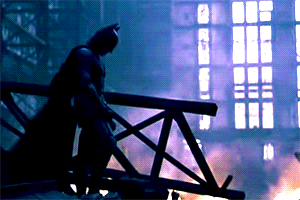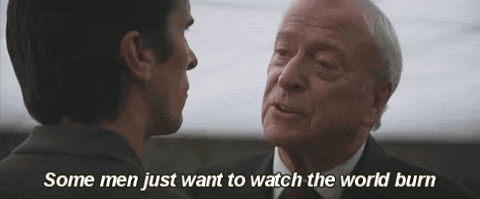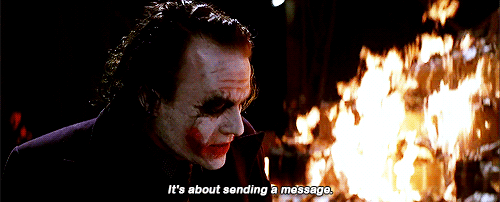 |
| Holy Oscars Batman! |
The film begins with Gotham in a state of relative calm thanks to the efforts of Batman and Commissioner Gordon. Meanwhile, the arrival of idealistic District Attorney Harvey Dent promises a brighter future for the city and leaves Bruce Wayne wondering if the time has come for Batman to finally hang up his cape and cowl. Just as peace finally seems to be within the city's reach, however, a new threat appears in the form of the Joker. Through his singular pursuit of social anarchy the Joker plunges the city's law abiding citizens and criminals alike into a state of perpetual chaos, and pushes Batman and his allies to the very edge of darkness.
Easily the darkest and most complex entry in the Batman franchise The Dark Knight portrays the utter chaos of a world at war with itself. Through his central struggle against the Joker Batman is forced to confront numerous ethical questions which call his moral code into question. These same questions surrounding law enforcement, citizen surveillance, and vigilante justice particularly resonated with viewers at the time of the film's release during the War on Terror, and have gained even greater relevance in the midst of today's social unrest. In the wake of the tragic murder of unarmed civilian George Floyd at the hands of police cities around the world have seen protesters filling their streets to demand justice. What began as peaceful protests has in many cities, however, descended into violence, destruction, and mayhem. The rioting, looting, and attacks on both law enforcement and civilians does nothing to further racial equality or to ensure that Floyd's killer is brought to justice. What this wanton destruction does do is perpetuate further injustice as it plunges city streets into the same sort of chaos and anarchy that the Joker brings to Gotham. Those responsible for this mayhem, whether they be opportunistic criminals, extremist Antifa militants, or members of the Black Liberation Army and Weather Underground inspired group Black Lives Matter, may claim to be seeking justice, but are in fact only ensuring that the world around them burns. This unrest leaves us grappling with many of the same questions that Batman faces as he struggles to uphold the law even as the forces around him push him ever closer to breaking it himself. These are indeed some of the darkest days in recent memory, but as Harvey Dent assures the citizens of Gotham City "the night is darkest just before dawn", and if we stand together in unity against these agents of chaos and demand that our leaders stand with us against this destruction dawn will come.
Gotham City and its enduring struggle against evil is brilliantly brought to life thanks to the superb work of the film's cast. Maggie Gyllenhaal is a welcome addition to the cast, replacing Katie Holmes as Assistant District Attorney Rachel Dawes. In Gyllenhaal's capable hands Rachel is transformed from stock love interest to a fully realized heroine in her own right. Aaron Eckhart shines as Gotham's charismatic 'White Knight' Harvey Dent and portrays Harvey's transformation into ruthless vigilante Two-Face with tragic anguish. Gary Oldman perfectly captures Commissioner Gordon's essential honesty and growing world weariness as he struggles to remain morally upright in a world of corruption. Morgan Freeman and Michael Caine aptly fill dual roles as both Bruce Wayne's and the films' consciences in their portrayals of Wayne Enterprises' CEO Lucius Fox and Bruce's best friend and butler, Alfred. Christian Bale and Heath Ledger dominate the film in their portrayals of Bruce Wayne/Batman and the Joker. Ledger is nearly unrecognizable as he transforms into the personification of chaos in the form of the Joker. The performance is more than worthy of his posthumous Oscar for Best Supporting Actor as he infuses his every gesture with a manic energy and underlying menace. Bale turns in an iconic performance that surpasses any in the Batman franchise and perhaps even in the entire superhero genre as he expertly captures the dark knight's reluctant heroism even as he struggles to battle his inner demons. Together, the two engage in a battle of the wills that is the stuff of cinematic legend.
Tragic, twisted, tumultuous, and ultimately triumphant The Dark Knight is more than just a super hero movie, it is a story for our times. Through its brilliant script and magnetic performances the film breathes fresh life into the Batman franchise while paying apt homage to the films and comic books that came before it. The film's gritty portrayal of the timeless struggles between good and evil and chaos and order make it both timeless and eerily timely in today's current state of unrest. In this uncertain time now more than ever we could all use, "a silent guardian, a watchful protector, a dark knight".



No comments:
Post a Comment